Australia’s youngest COVID-19 death has Chief Health Officer warning of complacency
Australia’s Deputy Chief Health Officer is urging Australians not to become complacent as COVID-19 restrictions ease, pointing to the shock death of a 30-year-old man.
Coronavirus
Don't miss out on the headlines from Coronavirus. Followed categories will be added to My News.
Australia’s youngest COVID-19 death
WHO warns we’re not out of first wave
Italian tenor Bocelli reveals COVID-19 diagnosis
Fremantle Port workers ‘exposed to virus
The death of a 30-year-old man, who succumbed to COVID-19 on Tuesday, has prompted Australia’s Deputy Chief Health Officer to warn the public of the risks of complacency as state and territory restrictions start to ease.
Professor Paul Kelly urged Australians to get tested if they felt sick and virus symptoms persisted, with the central Queensland man’s death “another very strong reminder to us all”.
“It might feel like a cold, it could be COVID and we really want to get that test done,” he said.
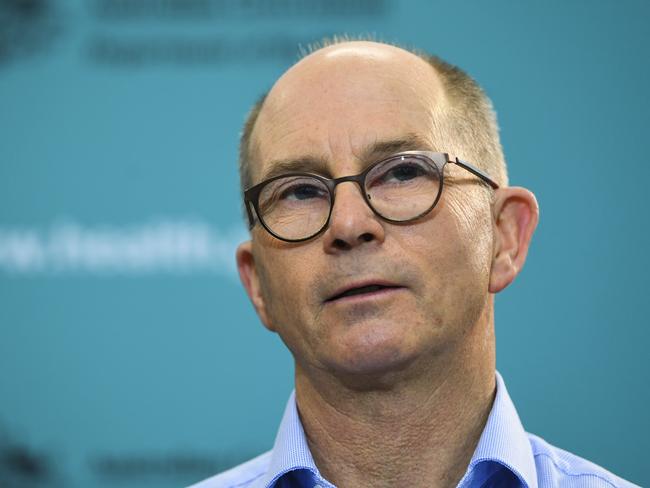
Professor Kelly reminded Australians on Wednesday to book in to receive the flu shot for the year, with 18 million already having done so – approximately five million more than last year.
“If you’re in those risk groups, which are the same for COVID-19 and for influenza –
so people over the age of 65, people with certain chronic illnesses, Aboriginal and Torres Strait Islanders in particular – you should really be considering having your flu shot,” he said.
AUSTRALIA’S YOUNGEST COVID-19 DEATH
A Queensland man has become Australia’s youngest virus fatality.
The 30-year-old man died in Blackwater after showing symptoms for several weeks, and tested positive to the virus following his death.
His partner is now sick and has been taken to Rockhampton Hospital.
Police and ambulance were called to the home in Blackwater on Tuesday afternoon, where the man’s partner had found him unresponsive after returning home from work.
The police and ambulance officers who attended the scene are also now in quarantine.
Authorities are investigating whether the virus or the man’s other known illnesses caused his death.
The cases are the first recorded in Blackwater, near Emerald in central Queensland, and residents with symptoms are being urged to get tested immediately.
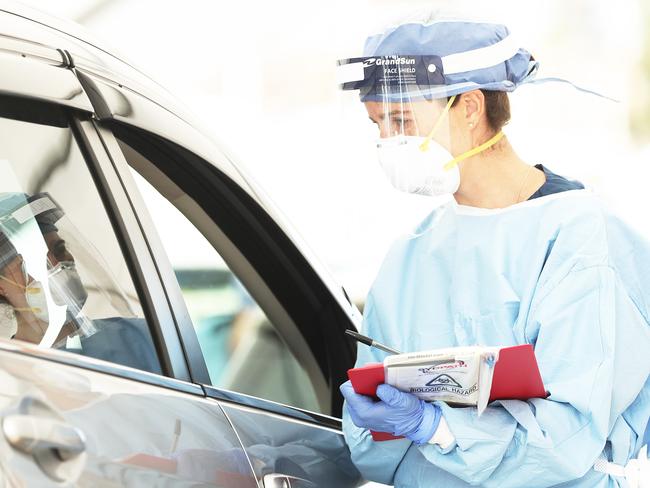
“It’s a timely reminder for all Queenslanders that this COVID is real, it’s out there, and it has impacts on Queenslanders and in this case, we have lost another Queenslander today,” Health Minister Steven Miles said today.
A team of public health experts and additional contact tracing resources have been deployed from Brisbane to Blackwater to track the possible source of the virus.
The victim has not worked since November and has not left the central Queensland town since February.
He becomes the state’s seventh COVID-19 casualty.
WHO WARNS WE’RE NOT OUT OF FIRST WAVE
A global health expert is warning that the world is still in the very middle of the outbreak, dampening hopes for a speedy global economic rebound and renewed international travel.
“Right now, we’re not in the second wave. We’re right in the middle of the first wave globally,” said Dr Mike Ryan, the World Health Organisation’s executive director.
“We’re still very much in a phase where the disease is actually on the way up,” Mr Ryan said, pointing to South America, South Asia and other parts of the world.
India, with a population of more than 1.3 billion, saw a record single-day jump in new cases for the seventh straight day.
It reported 6535 new infections on Tuesday (local time), raising its total to more than 145,000, including close to 4200 deaths.
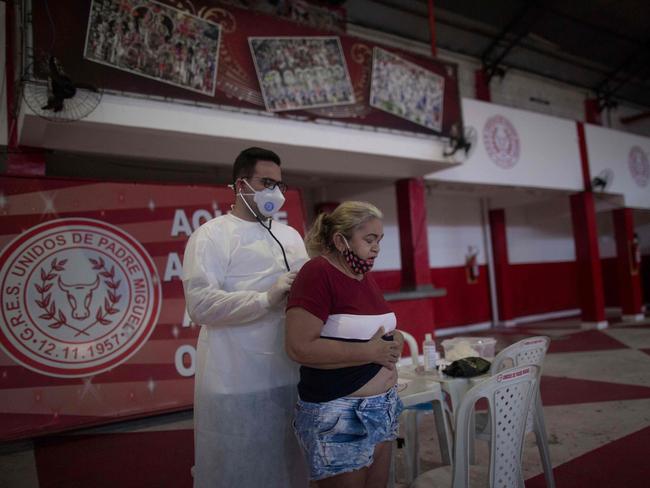
The virus has taken hold in some of the country’s poorest, most densely populated areas, underscoring the challenges authorities face in trying to contain a virus for which no vaccine or cure has yet to be developed.
Most of India’s cases are concentrated in the western states of Maharashtra, home to the financial hub of Mumbai, and Gujarat.
Infections have also climbed in the east as migrant workers stranded by lockdowns returned to their native villages from India’s largest cities.
Despite this, India allowed domestic flights to resume on Monday following a two-month hiatus, but at a fraction of normal traffic levels.
In Brazil, where President Jair Bosonaro has raged against state and local leaders enforcing stay-at-home measures, WHO warned that before reopening the economy, authorities must have enough testing in place to control the spread of the virus.
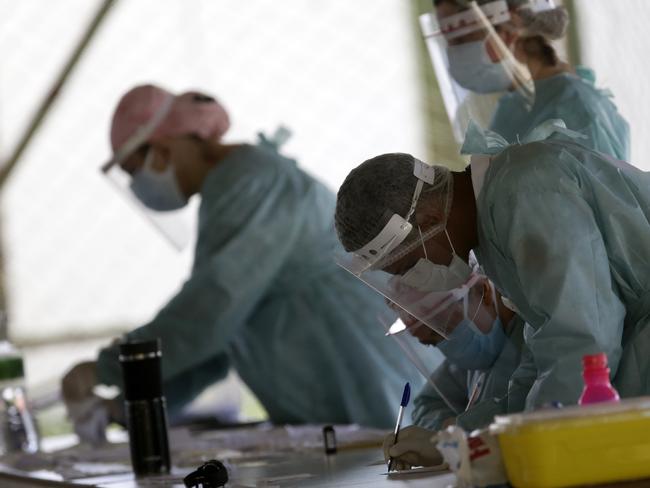
Brazil has 375,000 coronavirus infections – second only to the 1.6 million cases in the US – and has counted more than 23,000 deaths, but many fear Brazil’s true toll is much higher.
Ryan said Brazil’s “intense” transmission rates means it should keep some stay-at-home measures in place, regardless of the damage to the economy.
“You must continue to do everything you can,” he said.
But Sao Paulo Governor Joao Doria has ruled out a full lockdown in Brazil’s largest state economy and plans to start loosening restrictions on June 1.
A US travel ban was set to take effect on Tuesday for foreigners coming from Brazil.
In Europe, Russian President Vladimir Putin announced that the postponed military parade marking the 75th anniversary of the allied victory in the World War II will take place on June 24.
Victory Day has become the most important holiday in Russia, marked every year on May 9 with a show of armed might in Red Square.
Putin said the country had passed the peak of the outbreak.
Russia reported a record one-day spike on Tuesday of 174 deaths, bringing the country’s confirmed death toll to more than 3800.
Russia’s coronavirus caseload surpassed 360,000 – the third-highest in the world – with almost 9000 new infections registered.
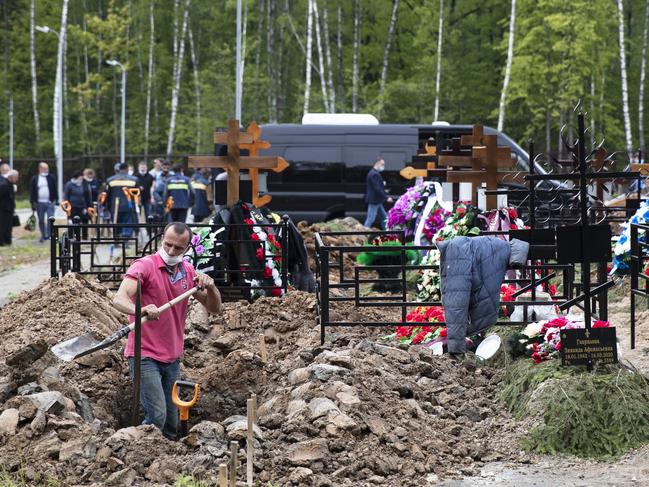
The country’s comparatively low mortality rate has raised questions among experts.
Russian officials vehemently deny manipulating any figures and attribute the low numbers to the effectiveness of the country’s lockdowns.
The question of who can travel where and when remains a dilemma in many places.
Spain’s foreign minister said that European Union members should collectively agree to open borders and determine which non-EU countries are safe for travel.
“We have to start working with our European partners to retake the freedom of movement in European territories,” Arancha Gonzalez Laya told Cadena SER radio.
Spain is eager to welcome tourists to shore up an industry that accounts for 12 per cent of the country’s GDP.
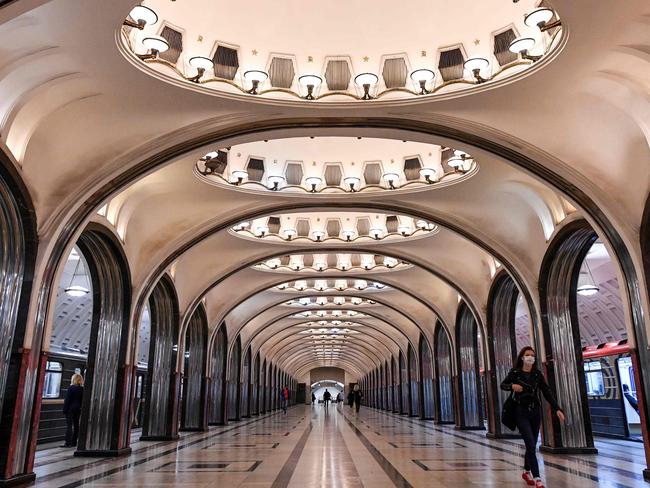
Aiming to entice travellers, Greek authorities will introduce cheaper tickets for sea travel from the mainland to Greek islands on June 1.
The Czech Republic, Hungary and Slovakia struck a deal to open their borders for 48 hours of travel without quarantines among their citizens starting on Wednesday.
Indonesia said it would deploy 340,000 security forces in 25 cities to enforce health rules as the world’s fourth most populous nation prepares to reopen shopping centres and other businesses in the capital Jakarta on June 4.
“We want to get into a new normal and enter a new order,” Indonesia’s President Joko Widodo said after inspecting moves to reopen Jakarta’s subway and a shopping mall in Bekasi.
South Korea began requiring people to wear masks on public transit and in taxis.
The country is tracing dozens of infections linked to nightclubs and other venues as it prepares for 2.4 million students to return to school on Wednesday.

South Korea’s Health Ministry said beginning in June, “high-risk” businesses such as bars, nightclubs, gyms, karaoke rooms and concert halls will be required to use QR codes to register customers so they can be found more easily when infections occur.
Privacy watchdog group Jinbo Net called the move excessive.
“That’s exactly how we step into a surveillance state,” it said.
Back home, NSW Chief Health Officer Kerry Chant believes the state is unlikely to face another major outbreak of COVID-19 this year, with the virus effectively contained and transmission rates reduced to nearly zero.
In a private briefing with NSW politicians on Tuesday, Dr Chant said the likelihood of a second wave occurring in NSW would be low, The Australian reports.
But she said this would depend on people following strict social-distancing rules and best hygiene practices.
ITALIAN TENOR BOCELLI REVEALS COVID-19 DIAGNOSIS
Renowned Italian tenor Andrea Bocelli said Tuesday he had caught the novel coronavirus but was now recovered, describing the experience as “a nightmare”.
Bocelli, who has been blind since age 12, raised spirits in Italy during the pandemic, which has killed nearly 33,000 people, by singing alone in Milan’s Duomo on April 12.
That was just over a month after the 61-year-old had tested positive for the virus.
“It was a tragedy, my whole family was contaminated,” he told journalists at a hospital in Pisa where he had gone with his wife to donate their plasma for COVID-19 research.
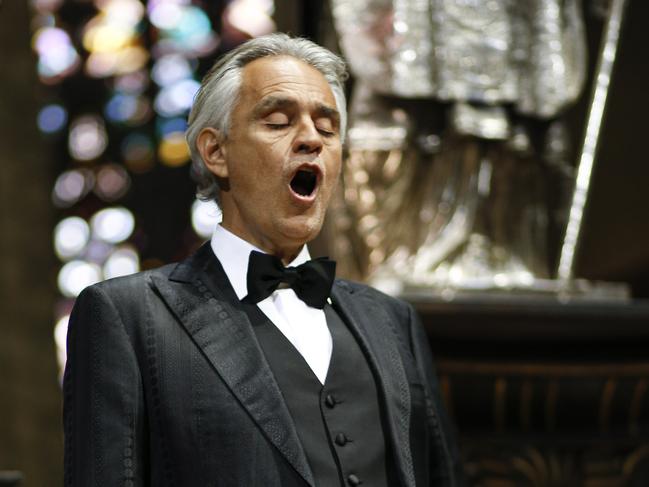
The blood plasma will be used by scientists hoping to develop treatments.
“We all had a fever – though thankfully not high ones – with sneezing and coughing,” Bocelli said.
“I had to cancel many concerts … It was like living a nightmare because I felt like I was no longer in control of things. I was hoping to wake up at any moment,” he said.
The singer, who has sold over 90 million records worldwide, said he “thanks God” he was not a politician who had to take decisions but felt there was “too much scaremongering” about COVID-19 in Italy now the crisis appears to have passed its peak.
FREMANTLE PORT WORKERS ‘EXPOSED’ TO VIRUS
Fremantle port workers may have been exposed to COVID-19 when they boarded an infected live export ship that had apparently been cleared by a federal department to dock, despite knowing some of the crew were ill.
But the Department of Agriculture, Water and the Environment insists it only found out some crew members had fever after the vessel reached port.
The Al Kuwait arrived on Friday after sailing from the United Arab Emirates and six of the 48 multinational crew have since tested positive.
According to Western Australian Police Commissioner Chris Dawson, a report was submitted to the federal department advising that some of the crew were ill on Wednesday.
But the Fremantle Port Authority only found out after up to half a dozen local workers boarded the ship, Mr Dawson says.
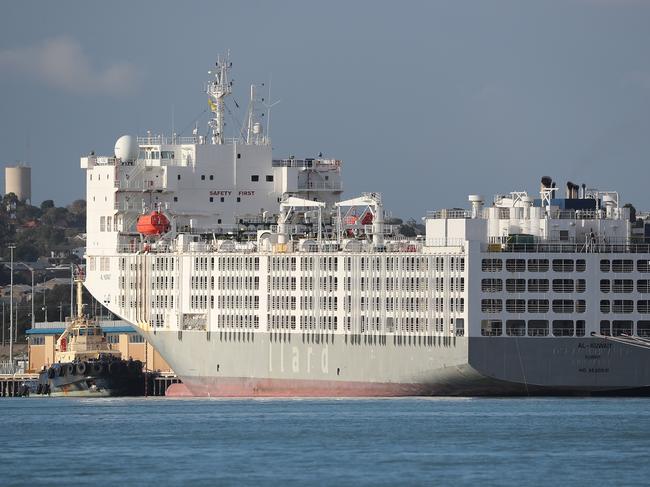
WA Premier Mark McGowan says the workers are being isolated and contact tracing is under way.
Mr McGowan says he doesn’t want to “point fingers at this point in time” but state authorities are working to find out what went wrong.
“We’re very concerned and to a degree, disappointed,” he said on Tuesday.
“Clearly, if there’s cases of people reporting high temperatures on board … red flags should be raised.
“So I just say to everyone involved, in particular the Commonwealth agencies that knew about this, they need to be on guard and be alert.”
The federal agriculture department said it had been advised some crew members were unwell, but didn’t know any of them had elevated temperatures or coronavirus-like symptoms before the vessel docked.
It learnt crew members had fever when the ship arrived and immediately told the WA health department.
“The WA state Department of Health is responsible for the management of this incident, including all decisions relating to human health,” the federal department said in a statement.
No Al Kuwait crew members had been permitted to disembark and all federal department staff attended the vessel wearing full personal protective equipment.
“The Department of Agriculture, Water and the Environment is confident that government protocols were met,” the statement said.
Mr McGowan said the crew who tested positive were being quarantined at a Perth hotel while the remaining 42 appeared well and were being kept on board the ship.
They would be monitored and given health assessments as required. Mr McGowan said the state government wanted the ship to set sail as soon as possible, but it needed to be cleaned first.
Mr Dawson suggested the federal agriculture department should do the fumigation, saying: “The Commonwealth have responsibilities here.”
Border Force said it completed all customs and immigration-related clearances, but received no reports of illness on board the vessel on the day of or prior to its arrival in port.
The six new cases bring the number of active cases in WA to 12 after a Victorian family returned from Qatar with the disease on May 17.
The state government remains adamant the interstate border will remained closed for months.
END BORDER ‘ONE-UPMANSHIP’
Tasmanian Premier Peter Gutwein has called for his counterparts to end their one-upmanship around the issue of state border closures.
Mr Gutwein on Tuesday indicated some of the island’s coronavirus restrictions could be eased ahead of schedule before the June long weekend.
He revealed he had spoken to some state and territory leaders about borders but reiterated he would wait until at least July before making any decision on when and if Tasmania would reopen.
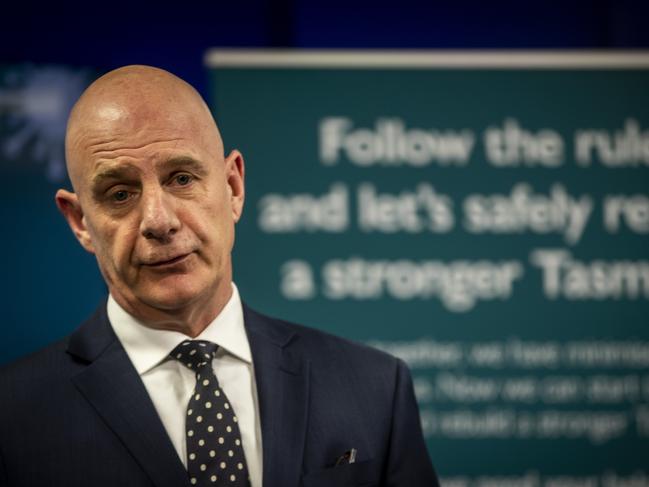
“We’ll be guided by public health. I would just encourage all of the premiers around the country to stop what appears to be this game of one-upmanship,” he said.
“I won’t comment on the way the Queensland premier deals with her borders nor how the NSW premier deals with hers.
“It’s quite obvious the federal government has a view but my job is protect the best interests of Tasmanians.”
Tasmania is due to progress to stage two of eased restrictions on June 15, having opened cafes and restaurants for up to 10 people last week as part of stage one.
Mr Gutwein said there could be some earlier easing before the June 8 Queen’s birthday long weekend.
He reiterated any decision would be based on health advice and high levels of testing.
About 300-400 people are being tested each day but the state’s public health service wants the figure to be closer to 700.
Tasmania has gone 11 days without recording a new coronavirus case after none emerged on Tuesday. Just seven cases have been confirmed this month.
The state’s number of active cases has dropped to eight while 205 people from a total 226 confirmed cases have now recovered.
“If this was a football match, we’re now in the last quarter. The wind is at our back, but it ain’t over ‘til it’s over,” Mr Gutwein said.


